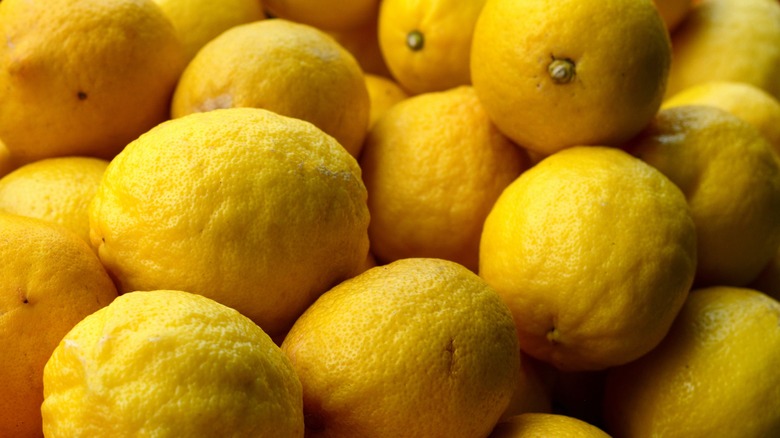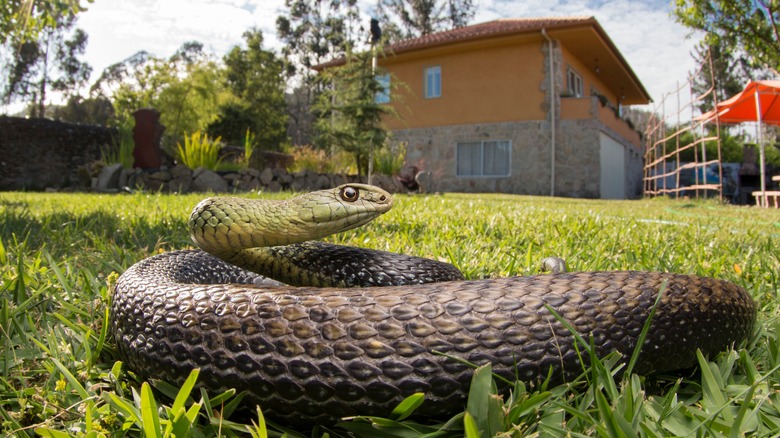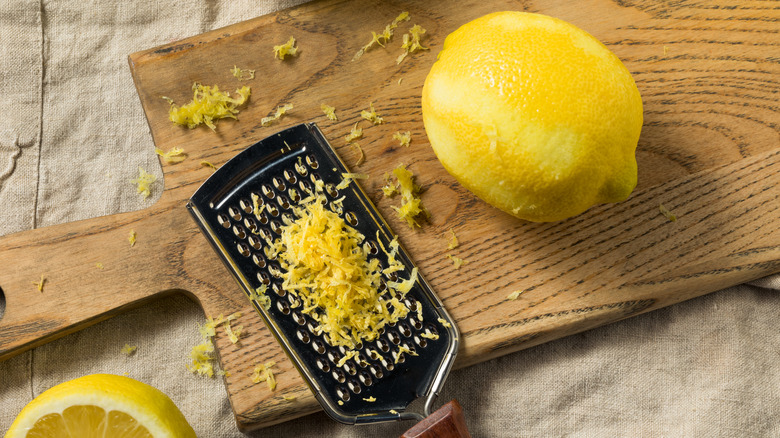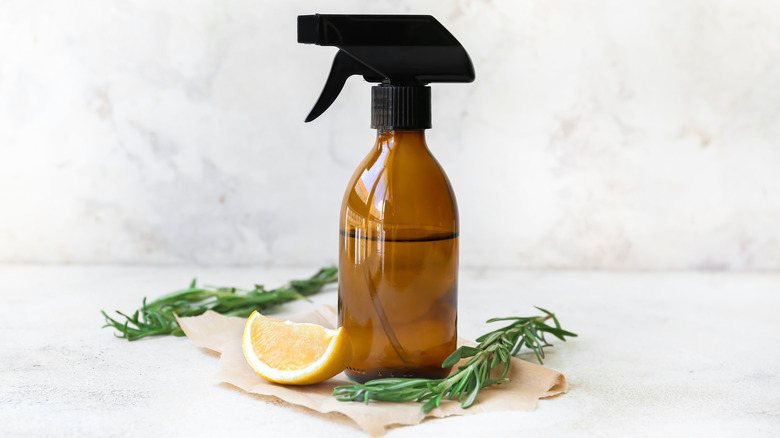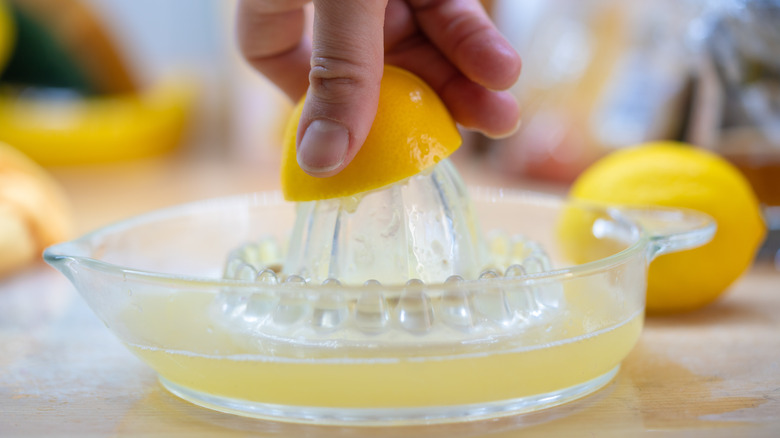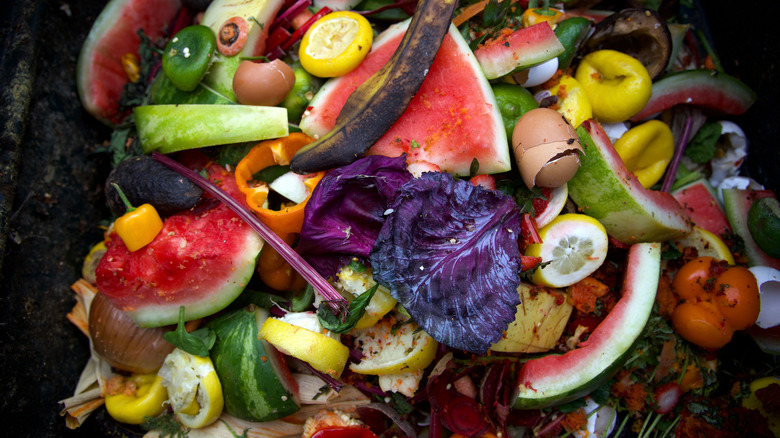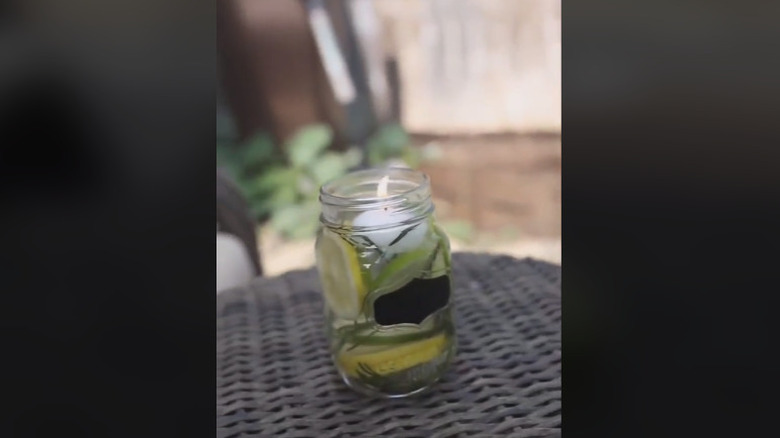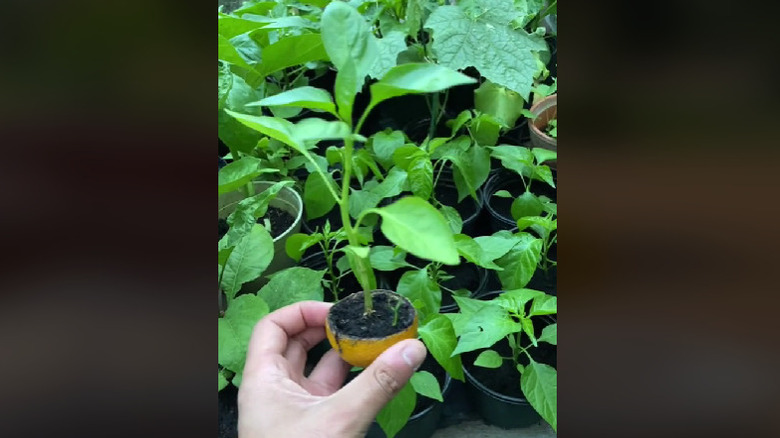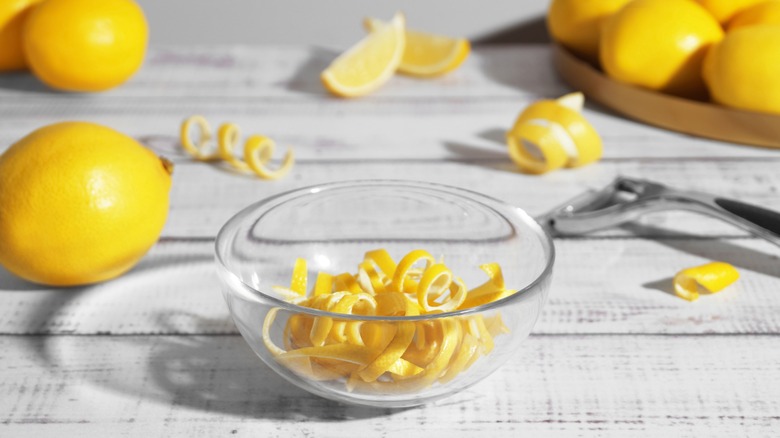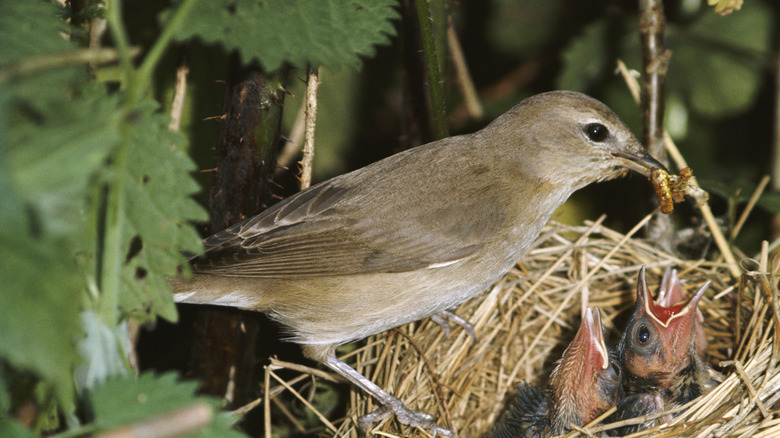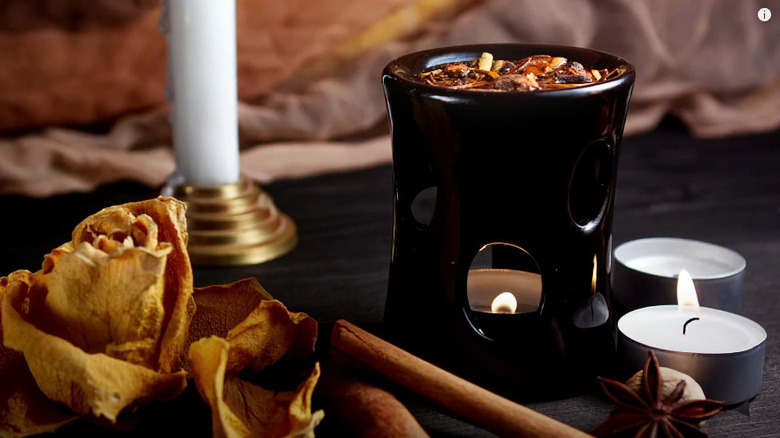12 Ways To Use Lemon Around Your Backyard And Garden
While lemons can make for a refreshing glass of lemonade on those hot summer days and a delicious pie to share with friends, they can be used for much more than food. The small yellow fruit is quite versatile and offers a variety of benefits for both your backyard and your garden. Because you most likely have some lemons on hand, you'll find repurposing them also saves money and reduces the need to purchase chemical pesticides, fertilizers, and weed killers.
Offering a plethora of uses, you'll quickly discover lemons are an indispensable tool that you won't want to live without. The citrus fruit does an excellent job of making garden soil more acidic while also acting as a powerful weed killer. You can turned into a fragrant air freshener and transformed into a pest-repellent candle. The peels even make excellent seed starters. All you need to do to improve your backyard and garden is roll up your sleeves and get ready to implement the genius tips below.
To keep snakes at bay
There's nothing more disturbing than taking a leisurely stroll through your garden only to suddenly encounter a snake. While most snakes are harmless, the slithering creatures may still bite if they feel threatened. That puts children and pets at risk when playing in the backyard. Instead of having to chase the snakes away or call animal control, you can take steps to repel them from ever entering your outdoor space. Because snakes hate the smell of citrus, you can easily create your own lemon repellent spray.
Lemon works as a natural snake repellent when you release the fresh citrus scent in spray form. To create your spray, save the peels of several lemons and place them inside a mason jar. Add water to the fill line and set the jar aside for a day or two. This gives the lemon time to infuse with the water. When the allotted time has passed, strain out the peels and pour the water into a spray bottle. You can toss the peels in your compost pile, so as not to waste them. Use the spray around the perimeter of your property, patio, and playground equipment. Repeat when the scent wanes or after a heavy rainfall.
Note: You can also plant lemongrass to continuously keep that lemon scent in the garden.
To make garden soil more acidic
Not all plants have the same growing requirements, including the type of soil they need to thrive. If the earth in your garden turns out to be alkaline, you'll find you can use lemons to help alter the soil's pH to make it more acidic for acid-loving plants. This is helpful when growing radishes, blueberries, daffodils, and azaleas. Of course, it's always best to test the pH of your soil before you make any amendments.
There are two ways you can transform your lemons before feeding them to your soil. First, you can create a liquid feed by mixing 2 tablespoons of lemon juice into a gallon of water. Apply this feed to the soil once a month during the growing season. What a Green Life suggests using either well water or collected rainwater versus just grabbing water from your tap. The second gardening hack that uses a leftover from your home bar to create more acidic soil involves grating the actual lemon peel. You can toss the resulting bits in planting holes or work them into the soil surrounding your established plants.
To create an all-natural air freshener
When you think of a fresh scent, a lemon-based aroma is sure to come to mind. This delightful citrus fruit produces a pleasant smell that isn't just useful indoors. You can also utilize lemons in the backyard on your patio or in picnic areas to keep the air smelling fresh. As an added bonus, a homemade air freshener can repel insects, keeping mosquitoes and ants from invading your space.
Squeeze out the juice from a few lemon wedges. Pour the juice in a spray bottle and add 1 cup of water. Shake to combine the two ingredients and then liberally apply the spray around your patio, garden, and backyard play areas. For a longer-lasting scent, swap out the fresh lemon juice for a few drops of lemon essential oil. Another option is to soak cotton balls in the air freshener and then disperse them around your outdoor entertainment spaces.
To eliminate weeds naturally
Unless you reside in a city apartment building, chances are you deal with weeds popping up in between your plants and garden pavers every spring and summer. Ignoring the weeds isn't an option, not only because it leaves a place looking unkempt and unattractive, but also because the weeds will steal nutrients from more desirable plants. One common kitchen ingredient you can use to take on the weeds in your lawn is lemons.
Lemon juice applied directly to weeds will kill them, making it an excellent alternative to chemical herbicides. The University of Tennessee reported that lemon juice alone was able to kill off 80% to 100% of the weeds' top growth. To create your natural weed eliminator, simply squeeze the juice of a few lemons into a spray bottle. Use the spray bottle to administer the juice to any weeds you see. It's important to note that lemon juice can also make the soil more acidic, so you won't want to use it around plants that prefer a more alkaline environment.
To create a healthy compost
Composting is an excellent way to create an all-natural soil amendment for your garden. Because it utilizes food scraps that you would normally throw in the trash, it's also an eco-friendly practice. Some of the best food scraps to add to your pile include fruits and vegetables, such as lemon peels. While you can use lemon peels in a traditional compost pile, they are even more effective when vermicomposting, according to a North Carolina State University study.
Set up a bin for your compost pile, making sure it's a nice distance away from your home. Compost piles can get a bit stinky. Place a layer of "brown" materials, like twigs, wood chips, autumn leaves, and animal manure at the bottom of the bin. Add a layer of "green" materials next, which will include your lemon peels, as well as any other produce scraps, grass clippings, and summer leaves. Continue alternating the brown and green layers until you get close to the top of your bin or you run out of materials. Make sure your top layer consists of brown materials. Keep the pile damp and turn it regularly. It can take anywhere from two to six months for the compost to be ready for your garden.
Tip: The Environmental Protection Agency suggests chopping your lemon peels and all of your food scraps into tiny pieces before tossing them in your compost pile. This reduces how long the pile takes to fully break down.
To make homemade pest-repellent candles
Whether you have a full patio set up in your backyard, or just a cute bench and side table out in your garden, the mosquitoes will be sure to find you. Instead of a relaxing afternoon enjoying the sunshine and blooming flowers, you'll be swatting and scratching thanks to these tiny pests. One way to protect yourself without having to resort to chemical sprays is to create homemade pest-repellent candles using a few slices of lemon.
To keep the backyard free of mosquitoes, grab a mason jar for each candle you'd like to make. Cut five or six lemon slices per candle and then insert them into the bottom of your jars. Add a sprig of rosemary to each jar before filling the jars with water. Place 10 drops of lemon essential oil and 10 drops of eucalyptus essential oil in each jar. Top the jars with a floating candle. In addition to keeping the mosquitoes away, the candles can also provide romantic lighting in the evening.
To create an all-natural seed starter
For seeds to germinate, they need protection from strong storms and hungry pests. Starting them in small pots can offer that protection. Instead of opting for plastic pots, consider creating your own all-natural seed starter pots from a batch of lemon peels. The peels of this popular citrus fruit are loaded with nutrients and ideal for acid-loving plants. In addition to being a more environmentally friendly choice, you'll also find using lemon peels won't increase your budget (unless you don't normally use lemons when cooking).
To create your all-natural seed starter pots, cut your lemons in half and scoop out the fruit. You can add the fruit to a salad or glass of iced tea or pour the juice over a freshly cooked fish. Poke two holes in the bottom of each lemon half before filling it with a "seed starting" potting mix. Set your seeds down inside the potting mix, add water, and then place the lemon peel seed pot out in the sun. When the plant has germinated, you can transplant it into your garden. Because the lemon peel will decompose on its own, you won't even need to remove the plant from the pot.
To make mulch for plants
There are many benefits to using mulch in a garden. Mulch not only helps the soil retain moisture, but it also keeps the soil warm, suppresses weeds, and returns nutrients back into the ground. Lemon peels, as well as those of other citrus fruits, can actually be used as mulch in place of other options, such as pine needles. As the lemon peel mulch breaks down, it will enrich the soil with calcium, sulfur, and magnesium.
To create your natural lemon peel mulch, you'll need to dry them out. After you've removed the peels from the fruit, you can place them in an air fryer and use the dehydrate setting. If you don't have an air fryer, there's also the option to dry them in the oven at 200 degrees Fahrenheit for approximately 25 minutes. You'll know the peels are dry when the edges begin to curl. Wait for the lemon peels to cool and then use them as mulch around the plants in your garden.
To keep birds from nesting on your property
Birds are fascinating to watch, but many species become aggressive when other birds and humans get too close to their nests. A few of these include blue jays, northern mockingbirds, gulls, and magpies. Because of this, you'll want to keep the birds from nesting in your backyard. One way to repel the birds is with lemons. This unexpected ingredient will keep birds out of your garden because they hate its the scent.
Creating a homemade bird repellent with lemons is a breeze. Grab a spray bottle and fill it with ¼ cup of water, ¼ cup of vinegar, seven drops of peppermint oil, and seven drops of lemon oil. Shake to combine the ingredients and then spray the solution anywhere you wish to deter birds from visiting. Another option is to grab a batch of cotton balls and soak them in the homemade repellent. Then, strategically place the cotton balls around your garden and backyard to keep the birds at bay.
Note: You will need to reapply the repellent weekly or after a heavy rainfall because it will lose its potency.
To attract butterflies to your garden
You may not want to draw birds to your property, but butterflies are another story. In addition their beauty, butterflies are excellent pollinators, so it's a great idea to do all you can to attract them to the garden. Unlike birds, which hate the scent of lemons, butterflies are actually drawn to it. They enjoy feeding on lemons. The fruit is a delicious nectar to them. There are actually a few different ways you can use lemons to entice butterflies to pay your garden a visit.
Slice a few lemons so that the pieces are circular instead of the traditional wedge shape. Set the slices around your garden on either a big rock, brick, paver, or tree stump. It won't take long for the butterflies to find their sour treat. If you want to keep the fruit part of the lemon for a fresh glass of lemonade, you can still attract the butterflies with the peel. Cut the lemons in half and use a juicer to remove the central flesh. Fill the halves back up with water and set them outside among the flowers in your garden.
To repel cats and dogs from the garden
Letting your four-legged friends frolic and play in the backyard helps them get the exercise they need to stay healthy. Unfortunately, dogs and cats may also make their way over to your garden and use it as a bathroom. Instead of keeping your beloved pets indoors or purchasing an expensive barrier, you can create an all-natural repellent using the peels of a lemon.
To deter dogs and cats from your flower beds, save some lemon peels. Cut them up into slices and then scatter them around the areas you want to keep animal-free. If you don't have any lemons on hand, you can use any citrus fruit in its place. They are all equally effective. Another option is to mix the lemon peels with your leftover coffee grinds. This is also a scent that pets tend to avoid. Scatter the repellent around your flowers as an added layer of protection.
To make homemade potpourri for your outdoor seating areas
Whether you have an outdoor patio or a seating area near your garden, you can create a homemade potpourri that will provide the space with an attractive scent that will make you want to stay outside for hours. Of course, you can always grab the potpourri and bring it indoors or make a second batch for your living room. One of the best fruits to add to a potpourri recipe is a lemon. Lemons produce a citrusy scent that is quite energizing. The fruit also pairs well with other herbs and spices, creating a variety of charming blends.
To make the potpourri, you'll first want to add dried lemons or lemon slices to a bowl. You can stick with just lemons or a combination of citrus fruits. Dried apple slices also work well. Next, toss in some spices, such as cinnamon, star anise, nutmeg, or clove. Finish with a few dried herbs or flower petals. You could use lavender, rosemary, eucalyptus, or rose petals. Crush the ingredients slightly by pressing down on them with the back of a spoon. Set the bowl on your patio table or by any outdoor seating areas. Potpourri loses its scent over time, so create a new batch every few weeks.
Tip: If you're looking for a stronger odor, you can always add a few drops of lemon essential oil (or any other essential oil) to the ingredients in your potpourri.
